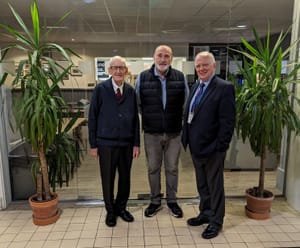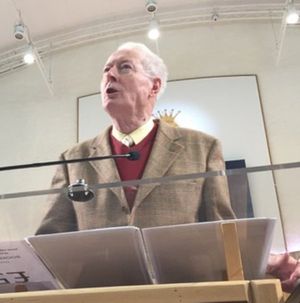In just these four words John the apostle, in the first chapter of his Gospel, gives us the reason for celebrating Christmas.
It is amazing how much can be said in a few words. Four words to describe one of the most significant, amazing and pivotal events in the whole of human history.
John is speaking about the birth of Jesus and is telling us that the baby born at Bethlehem already existed before this birth. Indeed, in another four-word statement John tells us that, ‘The Word was God’. In the same way, the first chapter of the first book of the Bible (Genesis) opens with another simple phrase overflowing with meaning, when it says, ‘In the beginning God’.

Eternal God
So John is saying that the babe born at Bethlehem is not only a true human being, but also the eternal God who has always been. It is this great fact that sets Christianity apart from all other world religions. The God revealed by Jesus Christ is not remote and unapproachable. He has come to this earth and lived among men in person.
He comes to us as one of us; ‘the infinite became an infant’. In one of the best known Christmas carols Charles Wesley wrote:
‘Veiled in flesh the Godhead see,
Hail the Incarnate deity.
Pleased as Man with men to dwell,
Jesus our Immanuel.’
The Word who is eternal deity became flesh and dwelt among men, and he did that out of love for us so that he might bring us to God. This is why it is never a small thing to be a Christian. It is the greatest, largest and most mind-stretching experience of human existence; it is a privilege beyond explaining. That is what we want you too to know.
Saviour
Let me just explain this a little more fully. Being conceived of a virgin by the miraculous power of God, Jesus was born sinless, and so his humanity is as true and uncorrupted as God first designed it.
That was essential because all mankind are sinners and have fallen short of God’s holy and perfect standard. We need a Saviour who is innocent and pure, and who can deliver us from the just punishment our sinfulness merits. Jesus became that innocent and pure man who was able to die for us and deliver us from our sins.

We must never think it was easy for Jesus to do all that he did; it was costly in every way. For a sinless and uncorrupted person to live among sinful and unrighteous people was an incredibly distressing experience. He came face to face with the consequences of sin every single day of his life, and it both grieved him and offended him.
Yet he brought healing and hope to many thousands of people, as he travelled around Palestine. And by his life, teaching and miracles he showed others who he really was. But Jesus’ principal task was to deal with sin itself by bearing its punishment, and to triumph over it so that he might bring new life and real joy to all who would receive him.
So, to grasp how marvellous Jesus’ coming into the world really is, we must pause and think about his bearing sin. His total innocence and purity made bearing sin a dreadful prospect for him. What he suffered in his soul as he approached death for us cannot be imagined: there was both the physical pains of crucifixion and the extremity of being cut off from God.
These sufferings amount to an inexpressible depth of grief and pain. But all that Jesus did was a supreme act of love. The apostle Paul speaks about ‘the Son of God who loved me and gave himself for me’. That is what makes Christianity so different. It is about infinite love and justice producing for all who turn to Christ the most wonderful forgiveness, peace with God and confident hope of eternal life.
Lord
So, when John says, ‘The Word became flesh’, he is telling us that Jesus became a human being so that he could offer himself as a sacrifice, to pay for the sins of his people.
Jesus alone was able to suffer the penalty of death for sin in his human nature and yet, because he was divine, conquer death and satisfy the infinite demands of God’s justice. And all that was shown to be true when he rose from the dead on Easter Sunday.
All I have tried to explain above is largely based on what John wrote in the first chapter of his Gospel. In that same chapter John shows us two possible responses to this message.
The first response is to reject the message, saying, ‘I don’t know this Jesus and I don’t want to know him or receive him’. Sadly, many who lived in Palestine when Jesus walked on earth took that attitude, and many today in our nation do the same, to their eternal loss.
The alternative response is to say, ‘I want to know him and receive him’. And you can know and receive him by simply believing on him; that is, by asking him to make himself known to you and to give you faith to believe on him. You see, ‘the Word became flesh’, so that you too might be made a son of God.
Roger Hitchings
Since his retirement from full-time pastoral ministry, Roger Hitchings has pursued an itinerant ministry. He also regularly speaks and writes on old age and dementia. He is chair of the Reformation and Revival Fellowship




















